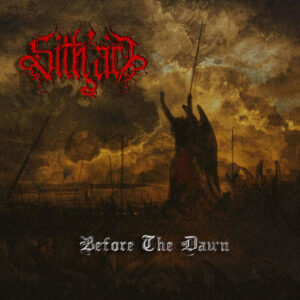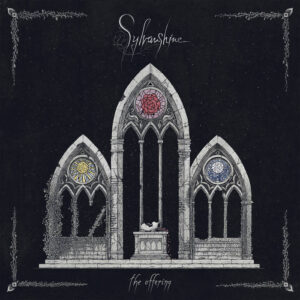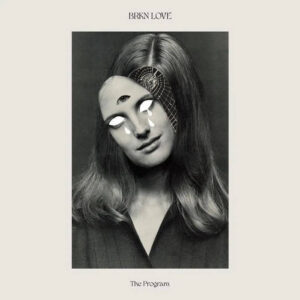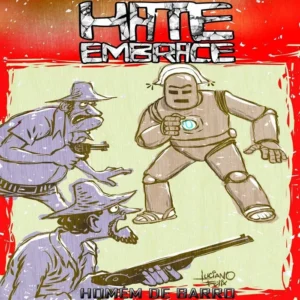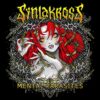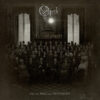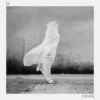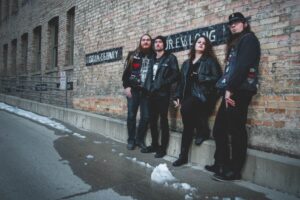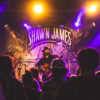Work is the Curse of the Drinking Class
Finnegan's Hell
•
March 16, 2020
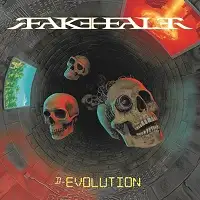
It's most fitting the latest release from Sweden's FINNEGAN'S HELL – purveyors of the subgenre you never knew you needed, Celtic/punk/folk/rock/metal – came across my headphones just in time for St. Patrick's Day. And while none of us will be celebrating in a way we might like to be in these dark times, "Work Is the Curse of the Drinking Class" is a rollicking good substitute. The band formed in 2010. Their EP, "The Molly Maguires," was released in 2011, followed by their debut album, "Drunk, Sick and Blue" in 2014 and "Life and Death" in 2018. And while it might be incongruous to think of a crop of Swedes sounding pretty damn Irish – or even wanting to in the first place – it works and works well.
The title track kicks off with lots of quick banjo picking and slamming punky chords, the lyrics spat out almost like a curse. It's a tale of the narrator's father passing away after working hard his whole life and never having time for fun ("Instead of making progress/We work harder every day," he notes, "progress" being more time to imbibe, of course). They make reference to the famed quote ("Oscar Wilde, I'll raise my glass"), and there's barely enough time to blurt out all the words in the chorus because it's so fast, but no mind – it's all in the DIY punk spirit. "Six Feet Under" is an irresistible blend of concertina, whistle and more of those RAMONES-esque power chords, with the group vocals on the chorus, as per most bands of this type, encouraging maximum audience participation. It's another ode to the pleasures of alcohol ("if water was whiskey, I'd dive like a duck"), and that's OK because they do it with so much wit and humor – "Put me six feet underground/I'll still drink another round," they boast.
The dark swagger of "Whiskey, Rum, Gin and Wine" sounds like a detective show theme song, for lack of a better description. Wood block percussion punctuates the track throughout, especially in the bridge, along with guitar and plenty of muscular bass. It lauds one of the band's major influences, former POGUES front man Shane MacGowan, dropping not only his name, but a wry reference to his notoriously bad teeth. "The Promised Land," with its lovely lilting whistle and more concertina, is a bitter emigrant's story, about a man who comes to America and is bitterly disappointed, finding little prosperity despite a ton of hard work ("I thought I reached the promised land/But there is no such place"). It's as much a commentary on this day and age as much as it was in the days of the Irish diaspora – "I cursed the day I sailed/'Cause the land of the free will be the death of me," the narrator bitterly notes.
"Friends and Foes" has a killer opening salvo: "Jesus walked on water/Turned it into wine/But I never got to drink it/So he ain't no friend of mine." Never fear, the devil gets his due with cocaine, but that doesn't work out either ("I never got to snort it/So he ain't no friend of mine"). Our hero finally finds his "friend" when he meets Jack Daniels, who "made the drinks that'll be the death of me." These are immediate, punchy, catchy tracks that are super traditional in format and delivery, with verses that repeat in structure but change in sentiment, an extremely common feature of Irish music that the boys have mastered perfectly.
"King of the Bar," led by that whistle and a rapid-fire tempo, is a blasting ode to carpe diem, to I had a great day so let's drink and maybe have a crack at romance. Speaking of love, the latter three songs deal with that, none in a positive way. "The Last Dance" is set to a bit of a jig tempo, but it's decidedly sinister, explicitly praising the tempting charms of a belly dancer in the form of a cautionary parable. The chorus has a twisting, turning off-tempo rhythm and phrasing, and the track fades out with a delicate bit of almost military-style drumming.
"Tokyo Town" naturally has a vaguely Asian feel, courtesy of the banjo (of all things) and a suitably choppy groove. It's another bad romantic experience, this time with a comely barmaid. "Parasite" stars some great acoustic picking, and if you thought the last two relationships were bad, this one tops them both: "She took the house/She took the cat/She took the car/She took my hat/She took the book I had not read." Ouch. The terrific wah guitar effect segues into and duets with the concertina, showing the band's prowess in pairing rock and traditional instruments in unique ways.
Since the mood grows more somber as the album draws to a close, the final song, the slower and more reflective "When I'm Dead," serves as a most logical ending. The gritty, world-weary vocals, sung by all of the members, are dark and gloomy, almost humorously and excessively so. It's self-consciously maudlin – "plant no roses at my head," "sing no sad songs for me," like don't mourn me because I'm dead and I won't know any better. Their use of banjo throughout in this one in particular is really effective, showcasing the instrument's moods, not just happy and buoyant, but foreboding and mournful as well.
So open the windows and play this tomorrow, and in the successive tomorrows til the plague is hopefully behind us, and thanks to FINNEGAN'S HELL for raising our spirits – in both senses of that word.
9 / 10
Almost Perfect
Songwriting
Musicianship
Memorability
Production

"Work is the Curse of the Drinking Class" Track-listing:
1. Work Is the Curse of the Drinking Class
2. Six Feet Under
3. Whiskey, Rum, Gin and Wine
4. The Promised Land
5. Friends and Foes
6. King of the Bar
7. The Last Dance
8. Tokyo Town
9. Parasite
10. When I'm Dead
Finnegan's Hell Lineup:
Pabs, Mick, San, Old Roxy, Ace – Vocals and Various Instruments
More results...


